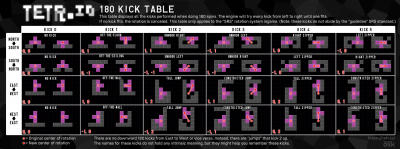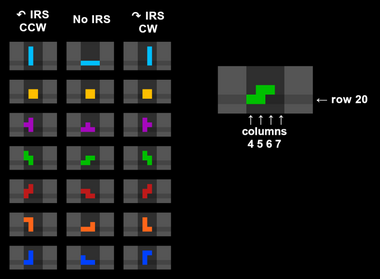From Hard Drop Tetris Wiki
(Undo revision 11682 by 89.187.135.24 (Talk)) |
Nukleopatra (talk | contribs) m (Text replacement - "[[Image:" to "[[File:") |
||
| (11 intermediate revisions by 6 users not shown) | |||
| Line 1: | Line 1: | ||
Rotation is a move to [[tetromino|tetrominos]], changing their [[orientation]] so that they will fit into the well in advantageous positions. Official or quasi-official Tetris [[game]]s give the player the ability to rotate a tetromino either clockwise or counterclockwise as many times as the player can before it [[Drop|locks]], with the exception of some earlier PC games which only allowed the player to rotate in one direction. All seven of the tetrominoes can be rotated, including the O piece (which only has one orientation in most games). | |||
In older or more simple Tetris games, if there is no space for the piece in its new orientation, it does not rotate. However, many games try to nudge the piece when rotating it against the walls of the [[playfield]] or against other blocks. These nudges are called [[wall kick]]s. Different games may have different wall kicks according to their respective [[rotation system|rotation systems]]. | |||
== <span id="180 rotations">180° Rotations</span> == | |||
[[File:180kicks.png|right|400px|thumb|T-piece kicks for [[SRS|SRS+]], the main rotation system used in [[TETR.IO]].]] | |||
In some unofficial Tetris games such as [[TETR.IO]], [[Jstris]], and [[Worldwide Combos]], a separate button is used to instantly rotate a piece to its 180° position, and is normally bound to A on keyboard layouts. This rotation can be useful to get some pieces, notably J and L, into normally unreachable places. TETR.IO's SRS+ also includes a separate kick table for 180 rotations, allowing for even more freedom to get pieces to where one wants. Its nature of replacing two separate rotation inputs with one also reduces the Keys per Piece statistic, and so improves one's finesse. | |||
== <span id="IRS">Initial rotation system (IRS)</span> == | == <span id="IRS">Initial rotation system (IRS)</span> == | ||
[[ | [[File:TGM_Legend_IRS.gif|right|frame|Illustration of IRS]] | ||
Some games, such as [[ | [[File:Fixedchart-full.png|right|380px|thumb|All spawn locations using IRS in Tetris Effect: Connected]] | ||
Some games, such as the [[Tetris The Grand Master|Tetris: the Grand Master]] series and [[Tetris Effect|Tetris Effect: Connected]], include a way to "buffer" a rotation before a piece enters the field and can prevent a blockout. This system is called the Initial Rotation System. | |||
IRS is performed by holding a rotate button during [[ARE|entry delay]]. It can be used to escape blockout, spawn a piece in a more favorable position to move across the stack in [[20G]] and high [[Drop#Gravity|gravity]], and in the case of Tetris Effect: Connected, spawn the piece higher than normal in order to move pieces more easily at a high stack/in the Zone. | |||
In Tetris Effect: Connected, if Initial Rotation is set to Type A, then if the same rotation button is held down until the next piece, that next piece will also be IRS'ed, and so on. This makes it easier to consecutively spawn pieces IRS'ed, and if the right keybinds are set, games can be played with IRS'ed pieces for the entire length of the level or gamemode. For Type B, only a rotation button during the few frames of entry delay can initiate IRS. | |||
{| | {| | ||
| Line 18: | Line 39: | ||
{{pfend}} | {{pfend}} | ||
{{pfstart}} | {{pfstart}} | ||
{{ | {{pfrowblank}} | ||
{{ | {{pfrowblank}} | ||
{{ | {{pfrowblank}} | ||
{{ | {{pfrowblank}} | ||
{{pfrow| |G|G| |G| | | | | }} | {{pfrow| |G|G| |G| | | | | }} | ||
{{pfrow|G|G|G|G|G|G|G|G|G| }} | {{pfrow|G|G|G|G|G|G|G|G|G| }} | ||
| Line 31: | Line 52: | ||
{{pfend}} | {{pfend}} | ||
{{pfstart}} | {{pfstart}} | ||
{{ | {{pfrowblank}} | ||
{{ | {{pfrowblank}} | ||
{{ | {{pfrowblank}} | ||
{{pfrow| | | |L|L|L| | | | }} | {{pfrow| | | |L|L|L| | | | }} | ||
{{pfrow| |G|G|L|G| | | | | }} | {{pfrow| |G|G|L|G| | | | | }} | ||
| Line 44: | Line 65: | ||
{{pfend}} | {{pfend}} | ||
{{pfstart}} | {{pfstart}} | ||
{{ | {{pfrowblank}} | ||
{{pfrow| | | | |L| | | | | }} | {{pfrow| | | | |L| | | | | }} | ||
{{pfrow| | | | |L| | | | | }} | {{pfrow| | | | |L| | | | | }} | ||
| Line 57: | Line 78: | ||
{{pfend}} | {{pfend}} | ||
{{pfstart}} | {{pfstart}} | ||
{{ | {{pfrowblank}} | ||
{{ | {{pfrowblank}} | ||
{{ | {{pfrowblank}} | ||
{{pfrow|L|L|L| | | | | | | }} | {{pfrow|L|L|L| | | | | | | }} | ||
{{pfrow|L|G|G| |G| | | | | }} | {{pfrow|L|G|G| |G| | | | | }} | ||
| Line 76: | Line 97: | ||
{{pfend}} | {{pfend}} | ||
{{pfstart}} | {{pfstart}} | ||
{{pfrow| | | | | |I| | | | }} | {{pfrow|B|B|B| | |I| |B|B|B}} | ||
{{pfrow| | | | | |I| | | | }} | {{pfrow|B|B|B| | |I| |B|B|B}} | ||
{{pfrow| | | | | |I| | | | }} | {{pfrow|B|B|B| | |I| |B|B|B}} | ||
{{pfrow| | | | | |I| | | | }} | {{pfrow|B|B|B| | |I| |B|B|B}} | ||
{{pfrow|G|G|G|G|G|G|G|G|G| }} | {{pfrow|G|G|G|G|G|G|G|G|G|G}} | ||
{{pfrow|G|G|G|G|G|G|G|G|G| }} | {{pfrow|G|G|G|G|G|G|G|G|G|G}} | ||
{{pfend}} | {{pfend}} | ||
In SRS,<br>the T tetromino | In SRS,<br>the T tetromino | ||
|{{pfstart}} | |{{pfstart}} | ||
{{ | {{pfrowblank}} | ||
{{ | {{pfrowblank}} | ||
{{pfend}} | {{pfend}} | ||
{{pfstart}} | {{pfstart}} | ||
{{pfrow| | | | |T|I| | | | }} | {{pfrow|B|B|B| |T|I| |B|B|B}} | ||
{{pfrow| | | |T|T|X| | | | }} | {{pfrow|B|B|B|T|T|X| |B|B|B}} | ||
{{pfrow| | | | | |I| | | | }} | {{pfrow|B|B|B| | |I| |B|B|B}} | ||
{{pfrow| | | | | |I| | | | }} | {{pfrow|B|B|B| | |I| |B|B|B}} | ||
{{pfrow|G|G|G|G|G|G|G|G|G| }} | {{pfrow|G|G|G|G|G|G|G|G|G|G}} | ||
{{pfrow|G|G|G|G|G|G|G|G|G| }} | {{pfrow|G|G|G|G|G|G|G|G|G|G}} | ||
{{pfend}} | |||
would <br>Block Out here. | |||
|-valign="top" | |||
|{{pfstart}} | |||
{{pfrow| | | |t|T|t| | | | }} | |||
{{pfrow| | | | |T| | | | | }} | |||
{{pfend}} | |||
{{pfstart}} | |||
{{pfrow|B|B|B| | |I| |B|B|B}} | |||
{{pfrow|B|B|B| | |I| |B|B|B}} | |||
{{pfrow|B|B|B| | |I| |B|B|B}} | |||
{{pfrow|B|B|B| | |I| |B|B|B}} | |||
{{pfrow|G|G|G|G|G|G|G|G|G|G}} | |||
{{pfrow|G|G|G|G|G|G|G|G|G|G}} | |||
{{pfend}} | {{pfend}} | ||
Hold CCW | |||
|{{pfstart}} | |{{pfstart}} | ||
{{ | {{pfrowblank}} | ||
{{ | {{pfrowblank}} | ||
{{pfend}} | {{pfend}} | ||
{{pfstart}} | {{pfstart}} | ||
{{pfrow| | | | |T|I| | | | }} | {{pfrow|B|B|B| |T|I| |B|B|B}} | ||
{{pfrow| | | |T|T| | {{pfrow|B|B|B|T|T|i| |B|B|B}} | ||
{{pfrow| | | | | | {{pfrow|B|B|B| |t|I| |B|B|B}} | ||
{{pfrow| | | | | |I| | | | }} | {{pfrow|B|B|B| | |I| |B|B|B}} | ||
{{pfrow|G|G|G|G|G|G|G|G|G| }} | {{pfrow|G|G|G|G|G|G|G|G|G|G}} | ||
{{pfrow|G|G|G|G|G|G|G|G|G| }} | {{pfrow|G|G|G|G|G|G|G|G|G|G}} | ||
{{pfend}} | {{pfend}} | ||
to place it here. | |||
|} | |} | ||
== See also == | == See also == | ||
*[[Rotation system]] | |||
*[[SRS]] | *[[SRS]] | ||
*[[TGM rotation]] | *[[TGM rotation]] | ||
*[[Twist]] | *[[Twist]] | ||
*[[Hold piece#Variants|Initial Hold System]] | |||
[[Category:Mobility]] | [[Category:Mobility]] | ||
Latest revision as of 07:01, 2 November 2023
Rotation is a move to tetrominos, changing their orientation so that they will fit into the well in advantageous positions. Official or quasi-official Tetris games give the player the ability to rotate a tetromino either clockwise or counterclockwise as many times as the player can before it locks, with the exception of some earlier PC games which only allowed the player to rotate in one direction. All seven of the tetrominoes can be rotated, including the O piece (which only has one orientation in most games).
In older or more simple Tetris games, if there is no space for the piece in its new orientation, it does not rotate. However, many games try to nudge the piece when rotating it against the walls of the playfield or against other blocks. These nudges are called wall kicks. Different games may have different wall kicks according to their respective rotation systems.
180° Rotations
In some unofficial Tetris games such as TETR.IO, Jstris, and Worldwide Combos, a separate button is used to instantly rotate a piece to its 180° position, and is normally bound to A on keyboard layouts. This rotation can be useful to get some pieces, notably J and L, into normally unreachable places. TETR.IO's SRS+ also includes a separate kick table for 180 rotations, allowing for even more freedom to get pieces to where one wants. Its nature of replacing two separate rotation inputs with one also reduces the Keys per Piece statistic, and so improves one's finesse.
Initial rotation system (IRS)
Some games, such as the Tetris: the Grand Master series and Tetris Effect: Connected, include a way to "buffer" a rotation before a piece enters the field and can prevent a blockout. This system is called the Initial Rotation System.
IRS is performed by holding a rotate button during entry delay. It can be used to escape blockout, spawn a piece in a more favorable position to move across the stack in 20G and high gravity, and in the case of Tetris Effect: Connected, spawn the piece higher than normal in order to move pieces more easily at a high stack/in the Zone.
In Tetris Effect: Connected, if Initial Rotation is set to Type A, then if the same rotation button is held down until the next piece, that next piece will also be IRS'ed, and so on. This makes it easier to consecutively spawn pieces IRS'ed, and if the right keybinds are set, games can be played with IRS'ed pieces for the entire length of the level or gamemode. For Type B, only a rotation button during the few frames of entry delay can initiate IRS.
In ARS, when the |
it normally gets |
So hold rotate left |
Now DAS left |
Ideally, the player should be able to use IRS to prevent block out:
In SRS, |
would | ||||
Hold CCW |
to place it here. |


